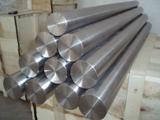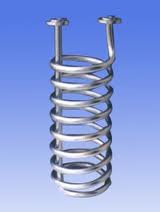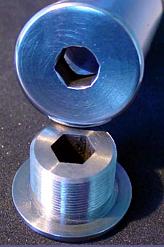Titanium and its alloys
 Titanium has no competitors among metals in many respects. It is recognized as the most reliable and long-lasting metal in use. Its inherent properties and characteristics give it resistance to the effects of various factors and environments.
Titanium has no competitors among metals in many respects. It is recognized as the most reliable and long-lasting metal in use. Its inherent properties and characteristics give it resistance to the effects of various factors and environments.
Titanium is resistant to temperature extremes and is able to withstand high thermal effects. It does not interact with chemicals, therefore it does not form salt compounds and does not oxidize when interacting with water and oxygen. With external action aimed at mechanical destruction of the material structure, titanium is the most durable metal.
According to its physical properties, titanium is very light. All these advantages and benefits make the demand for titanium in many areas of the national economy, energy, light and heavy industry, defense industry, medicine.
 Titanium is used in most cases as an alloy with accompanying substances that increase its quality, improve the processing and production of the necessary items. The most traditional alloying additions when melting titanium alloy are chromium, nickel, vanadium, aluminum, manganese, tin and iron.The technology and process of melting titanium alloys are quite labor-intensive and expensive, but the profitability of such production is justified due to several aspects.
Titanium is used in most cases as an alloy with accompanying substances that increase its quality, improve the processing and production of the necessary items. The most traditional alloying additions when melting titanium alloy are chromium, nickel, vanadium, aluminum, manganese, tin and iron.The technology and process of melting titanium alloys are quite labor-intensive and expensive, but the profitability of such production is justified due to several aspects.
First, titanium alloys have high strength, durability that is practically equal to absolute wear resistance. The consequence of this quality is the economic profitability of using a certain titanium object, due to the absence of costs for its replacement or repair. Although the probability of a fix remains, it is minimal.
 Second, the demand for titanium alloys, namely the demand for it. The point is that in certain areas of economic activity there is a need for the existence of a material whose properties will be close to the absolute indicators of reliability and exclude the probability of non-standard situations to a minimum or exclude them altogether.
Second, the demand for titanium alloys, namely the demand for it. The point is that in certain areas of economic activity there is a need for the existence of a material whose properties will be close to the absolute indicators of reliability and exclude the probability of non-standard situations to a minimum or exclude them altogether.
Among the industries, titanium and its alloys are most in demand for the production of parts, assemblies and assemblies in power engineering, aircraft construction, engine construction, light and heavy engineering, rocket construction, shipbuilding. In other words, titanium and its alloys are used in those industries whose sphere of activity involves increased risk, is exposed to extreme overloads of a thermal, physical, atomic, nuclear, chemical and mechanical nature.
Separately, the field of medical care can be noted, which widely uses a titanium-nickel alloy, which is known as a memory metal. This alloy is able to assume, after being placed in the human body, the shape it was originally given. It is also used in the field of bone prosthetics, the production of implants, both in general surgery and in dentistry.
Recently, titanium alloys have gained even more popularity in other fields of activity, such as IT technology, construction, development and production of weapons.
